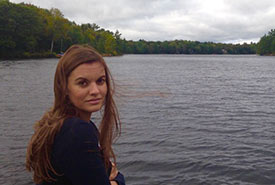Women in conservation: Kendra Pauley

Kendra at Muskoka, Ontario (Photo courtesy of Kendra Pauley)
In honour of International Women’s Day (March 8), we’re celebrating six female staff members at the Nature Conservancy of Canada (NCC) who are working to create a stronger future for Canada’s landscapes.
Growing up in rural southwest London, Ontario, Kendra Pauley spent much of her childhood exploring the Thames River, just 30 metres from her home, and making friends with the trees and animals in the surrounding riverside forest. From a young age, she came to learn about the unique wildlife in nearby towns, including the threatened spiny softshell turtle and American badger.
The tidal flats off the coast of New Brunswick near Port Elgin and Cape Tormentine, where Kendra’s relatives live, gave Kendra some of her most cherished childhood memories. She spent many summers in a cottage just a few kilometres from the Confederation Bridge and Cape Jourimain National Wildlife Area. She explored the tidal pools and flats for hours on end, intrigued by the abundance of hermit crabs, periwinkles, razor shells and sea creatures that the tide brought in.
As NCC's federal programs manager, Kendra uses her passion for species at risk and conservation and her education in non-profits, public policy and administration to deliver government funding programs to land trusts and conservation organizations across Canada.
Read my interview with Kendra below:
Wendy Ho (WH): Where did you go to school and what did you study?
Kendra Pauley (KP): I graduated with a degree in psychology from Western University in London, Ontario. Back in those days, I had my heart set on pursuing a path related to neuropsychology and/or child psychology, but life had other plans for me! I eventually went on to complete a master's of arts degree in public policy and administration at Ryerson University in Toronto. At Ryerson, while completing a research project comparing the United States’ Endangered Species Act to Canada’s Species at Risk Act, I rediscovered my passion for environmental issues and at-risk species.
WH: How has nature impacted your life?
KP: I first recall being hooked on nature when I was five years old, when my father took me walking through the forest behind my house. We saw birds, insects and many frogs, but the highlight of the trip was when my father turned over a log and, lo and behold, there was a salamander! This fascinating discovery led to many more hikes through the forest. Looking back, these trips with my father sparked my interest in nature and the memories fueled a passion for protecting species at risk and their habitats. My love of nature helped to forge strong relationships with family and friends, and made me aware of the personal impact I can have on the environment.
WH: What work/volunteer experience do you bring to NCC?
KP: I spent a lot of time at Ryerson studying non-profit organizations in relation to public-private partnerships, which has equipped me to manage the Natural Areas Conservation Program (a public-private partnership). I also completed an internship at World Wildlife Fund, where I was involved in GIS mapping and reviewing Arctic Indigenous peoples’ land use plans using a planning and conservation tool that recognizes and accommodates Arctic change. This internship prepared me for the challenges of working in a non-profit organization, and also contributed to my skill set by enhancing my communication, time management and data interpretation skills.
WH: Why is working at NCC important to you?
KP: Working at NCC is important to me because it relates to directly to my two passions: nature and non-profit organizations. The feeling of being part of something much bigger than myself, such as protecting Canada’s most precious landscapes, fuels my passion and work at NCC. Also, managing and administering federal funding programs, such as the OQO Program and the Ecological Gifts Program - Land Acquisition Support Fund, gives me the opportunity to connect with many local conservation organizations and land trusts that are powerful partners and allies in the effort to protect ecologically significant land. Working at NCC is the perfect blend of culture and challenge!
WH: What career advice would you give your younger self, if you could?
KP: Oh, where do I start? There is a quote by Mary Anne Radmacher that I have become particularly fond of: “Courage doesn’t always roar. Sometimes courage is the quiet voice at the end of the day saying, ‘I will try again tomorrow.’” My much younger self entered the workforce bright-eyed and bushy-tailed, with the expectation that I could (and would) easily solve all the world’s problems. It was years before I learned that sometimes failure and mistakes happen, and you simply must wake up the next day and tell yourself “I will try again tomorrow.”


